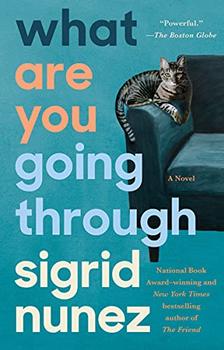Summary | Excerpt | Reading Guide | Reviews | Beyond the Book | Read-Alikes | Genres & Themes | Author Bio

This article relates to What Are You Going Through
 What Are You Going Through by Sigrid Nunez takes its title from the writing of Simone Weil, an influential French philosopher and intellectual whose work was unusual for incorporating both left-leaning politics and religious traditions.
What Are You Going Through by Sigrid Nunez takes its title from the writing of Simone Weil, an influential French philosopher and intellectual whose work was unusual for incorporating both left-leaning politics and religious traditions.
Weil was born in Paris on February 3, 1909 to agnostic Jewish parents. Her family was well-off and educated; her father practiced medicine and her older brother, Andre, would become a famous mathematician. At a young age, she began to adopt strong moral convictions; when she was five, she refused to consume sugar as a way of showing solidarity with the French troops fighting on the Western Front. She attended Lycée Henry-IV (a highly selective French secondary school), where she was taught by the philosopher Émile Chartier.
Weil went on to study philosophy at the prestigious French graduate school École Normale Supérieure. She earned first place in the Exam for General Philosophy and Logic with a paper on the work of Descartes, beating out fellow student and future well-known author Simone de Beauvoir, who took second. After graduating and passing the French Civil Service Examination, Weil took a position as an educator at a girls' secondary school. She continued to teach for most of her life while writing about political, social and religious issues, at times taking on other responsibilities and pursuits — for example, she worked as a factory laborer for a year in an attempt to better understand the conditions experienced by the working class.
Weil was interested in problems of social justice and bureaucratic oppression, identifying with both anarchism and Marxism. At the same time, she was critical of forceful revolution, favoring a rebalancing of labor through mutual organization. Despite being of Jewish heritage and an atheist earlier in life, Weil's work was influenced by Catholic religious traditions and her own mystical experiences. She studied multiple religions, including Hinduism and Buddhism, but was especially drawn to Catholicism. Her approach to practicing the religion reflected her liberal interpretation of it: She was never baptized into the Church, and was most interested in its spiritual and ceremonial aspects. In accordance with her beliefs, she led an ascetic lifestyle that contributed to her death from tuberculosis complications in 1943.
Despite only living to the age of 34 and having a relatively short writing career spanning 15 years, Weil's impact on social and intellectual thought was substantial. Albert Camus once referred to her as "the only great spirit of our time." T.S. Eliot described her as "a kind of genius akin to that of a saint."
The Weil quote that inspired the title of What Are You Going Through is an English translation of "Quel est ton tourment?" This question appears in Attente de Dieu (Waiting for God), a series of letters and essays including many of Weil's spiritual and religious thoughts. The writings were not originally intended to be published as a book and were collected posthumously, but Waiting for God is now considered a significant philosophical work. It explores the author's criticisms of orthodox Catholicism, her belief in a natural balance between God and humanity (as opposed to a God who rules over humanity) and "sacred longing," the idea that people are driven to look for beauty by their desire to connect with a higher power. Weil suggests that asking, "What are you going through?" is a way of loving one's neighbor by acknowledging their suffering.
Simone Weil
Filed under People, Eras & Events
![]() This "beyond the book article" relates to What Are You Going Through. It originally ran in November 2020 and has been updated for the
September 2021 paperback edition.
Go to magazine.
This "beyond the book article" relates to What Are You Going Through. It originally ran in November 2020 and has been updated for the
September 2021 paperback edition.
Go to magazine.
I am what the librarians have made me with a little assistance from a professor of Greek and a few poets
Click Here to find out who said this, as well as discovering other famous literary quotes!
Your guide toexceptional books
BookBrowse seeks out and recommends the best in contemporary fiction and nonfiction—books that not only engage and entertain but also deepen our understanding of ourselves and the world around us.